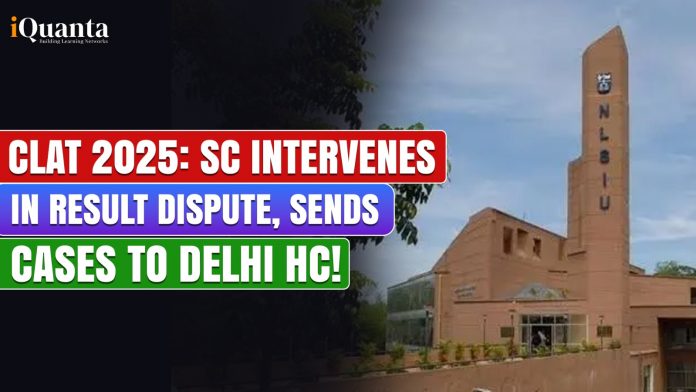In a major development which is bound to bring about transparency in the CLAT 2025 results, the Supreme Court of India has ordered on February 6, 2025, to transfer all petitions challenging the CLAT results to the Delhi High Court. This is happening at a time when errors in the CLAT answer key are causing a huge flutter in the minds of thousands of law aspirants who have been vying for admission to the prestigious NLUs in India.

This intervention, at the most elevated judicial forums, not only shows the next steps to handling the issues relating to the multifold petitions raised before various high courts but underlines the element of consistency and the importance of promptness to make things simpler. The subsequent section elaborates on the changes leading to an order for transfers, the present CLAT-2025 saga in legal proceedings, and the eventualities it portends for all the aspirants and the academic sphere of this education in the Indian sub-continent.
High Courts Where Petitions Are Pending
The following high courts currently have cases under consideration:
- Delhi HC
- Rajasthan HC
- Karnataka HC
- Jharkhand HC
- Rajasthan HC
- Bombay HC
- Madhya Pradesh HC
- Punjab and Haryana HC
The cases will be heard collectively on March 3.
A bench comprising Chief Justice of India Sanjiv Khanna, Justice PV Sanjay Kumar, and Justice KV Viswanathan passed the order of the transfer. The bench ordered the transfer to be completed within 7 days.
Why the CLAT 2025 Petitions Were Transferred to the Delhi High Court:
This comes following a decision made by the Delhi High Court on December 20, 2024 when Justice Jyoti Singh partially allowed a petition filed by a 17-year-old CLAT-UG candidate, Aditya. The petition contained two critical errors in the CLAT-UG examination conducted for admissions to National Law Universities (NLUs). Reviewing the case, Justice Singh pointed out that of the five questions under dispute, two were incorrect and such lapses could not be ignored.
It thus directed the NLU Consortium to publish revised results, including corrected scores for affected questions. But both the Consortium and Aditya were unhappy with this judgment and filed their appeals in the Supreme Court as well. As a result, the Supreme Court has now directed all related matters to be consolidated under the jurisdiction of the Delhi High Court for a uniform and conclusive decision over the discrepancies that occurred in the CLAT 2025 exam.
The CLAT 2025 Legal Dispute: A Series of Petitions:
CLAT, a national-level entrance exam conducted by the Consortium of National Law Universities (CNLU), is the doorway to admission into undergraduate and postgraduate law programs in 25 NLUs across India. The 2025 session of the exam has been tainted by a string of legal battles, with several aspirants lodging complaints of errors in the result of the exam, answer key mistakes, and procedural lapses. These disputes have been filed by petitioners in various High Courts, including Karnataka, Jharkhand, Rajasthan, Bombay, Madhya Pradesh, Calcutta, and Punjab & Haryana.
The legal war over CLAT 2025 gathered momentum after a single judge of the Delhi High Court delivered a verdict in December 2024. In the order, the court declared two questions of the CLAT undergraduate exam, part of the contentious answer key, to be erroneous. The judge ordered the NLU Consortium to publish corrected results for the two questions, a move that was greeted with mixed feelings. The NLU Consortium, as well as the petitioner in the case, both went to the appeal against the verdict, which further intensified the legal war.

With the various petitions piling up in various High Courts, the necessity for a central and concerted approach became all the more obvious. It was this that drove the CNLU to go to the Supreme Court, requesting a transfer of all such pending petitions to the top court for an authoritative verdict. However, in January 2025, the Supreme Court dismissed this appeal, opting for a more pragmatic solution instead: transferring all cases to a single High Court for quick disposal.
The Supreme Court’s Decision: Consolidating Petitions for Efficiency:
The Supreme Court moved all the pleas to the Delhi High Court in a well-reflected decision after much deliberation. A three-judge bench of Chief Justice of India Sanjiv Khanna, along with Justice Sanjay Kumar, and Justice KV Viswanathan, considered it wise to hear the cases by transferring them at one place because of the different judgments that they might have ordered.
The Supreme Court noted that the issues in various petitions were similar, with errors in the CLAT 2025 answer key, procedural irregularities, and fairness of the examination procedure. In view of such commonalities in the nature of disputes, the Court recognized that it would be far more efficient and effective to have all such petitions heard in one High Court. This would not only prevent delays and conflicting decisions but would also ensure that the case was dealt with expeditiously.
Solicitor General Tushar Mehta appeared for CNLU. He had submitted that the cases may be directed to either Punjab and Haryana High Court or Karnataka High Court. The case filing rate at these two courts are known to be high. However, the Supreme Court on taking the matter into consideration finally decided that the cases should be taken up by the Delhi High Court.
All the petitions regarding challenging the result of CLAT 2025 are to be transferred to Delhi High Court in a period of seven days after publication of such order of transfer, as ruled by the Supreme Court. In such a process, it gave the case further prominence by streamlining the hearings of all these petitions before a Division Bench in Delhi High Court itself.
Why the Transfer to the Delhi High Court?
The decision to move the cases to the Delhi High Court was not arbitrary. As a matter of fact, it was already engaging with the legality of the case of CLAT 2025 results, following the December 2024 decision by Justice Jyoti Singh. The case filed by a CLAT aspirant, Aditya Singh, had noted two questions to be incorrect and from the undergraduate exam, so the judge directed the NLU Consortium to come out with re-results.
The NLU Consortium appealed this judgment, and the matter is taken up by a Division Bench of the Delhi High Court towards the end of December 2024. In the appeal hearing, the Division Bench did not grant any interim relief but was prima facie in agreement with the findings of the Single Judge. The matter further complicated with other petitioners raising similar issues regarding additional questions in the CLAT 2025 exam.
Since the Delhi High Court had already intervened at an early stage in the dispute, further proceedings were best left to the same court. This avoids running the risk of possibly conflicting rulings from different High Courts and addresses the legal questions of the declaration of CLAT 2025 results.
Implications for CLAT Aspirants:
The implications of this transfer order would come about where there are thousands of CLAT aspirants anxiously anticipating the final resolution that would be arrived at by this forum about the disputes related to the exam. Centralizing these cases in one court will expedite the process of legal discussion and, thus, make the results of the CLAT 2025 exam more clear about their validity.
For many students, the uncertainty regarding the outcome of the examination results has been delaying admission processes into various National Law Universities. Now that legal challenges are heard in a single forum, hopefully, the swiftness and uniformity of the decision would bring the protracted uncertainty to an end. Emphasis on an expeditious hearing by the Supreme Court also seems to indicate that the legal battle may soon come to an end, and then the CNLU can go ahead with the admission process in time.
It must be mentioned that the issues against the CLAT 2025 results are not confined to only two challenged questions. A host of candidates have raised concerns regarding the conduct of the exam in general, such as the wrong answer keys, exorbitant fees for challenging answers, and procedural lapses. Such issues have motivated petitioners to move for a review of the results or even cancellation of the examination in some cases.
The Broader Legal and Educational Context
Indeed, the legal disputes over CLAT 2025 highlight broader issues in the Indian legal education system. For instance, the Common Law Admission Test, the door to entry into India’s first-rank law schools, has long been criticized for its lack of transparency and fairness in the examination process.
The continuous litigation challenges point toward greater accountability and transparency in conducting entrance exams, especially those at the national level. The scrutiny that has also come upon the NLU Consortium to manage this exam and further its fairness means that this particular legal battle will possibly bring future change in how the entire process of CLAT will be assessed.
Such cases remind one of the intricacies that go with the running of high-stakes exams, particularly when such exams call for assessment accuracy. For students, so much is at stake in these areas that doing things fairly and transparently is of utmost importance in conducting and examining tests.
Conclusion: Awaiting the Final Judgment
The Supreme Court has transferred all matters concerning CLAT 2025 results to the Delhi High Court, marking a watershed moment for the legal confrontation. Centralizing such cases in one court might enable the absence of conflicting pronouncements in the spirit of maintaining the integrity of the situation and allow for uninhibited resolution of the disputes in question. With another hearing scheduled for March 3, 2025, all eyes will be on the hearing, with hopes of a swift and just resolution that will clear the air regarding the future of legal admissions in India, this time from the end of aspirants, members of the NLU Consortium, and legal practitioners.
In a similar vein, during the coming weeks, the entire legal community and all aspirants would be hopeful for the consolidated petitions being heard at the Delhi High Court to entail a decision that will go beyond addressing the specific issues in CLAT 2025 to lay down how such issues should be handled in the subsequent iteration of the exam. Whatever be the outcome of this, it is likely to have far-reaching consequences in the direction of the credibility of the CLAT exam and transparency regarding the future of legal education in India.





